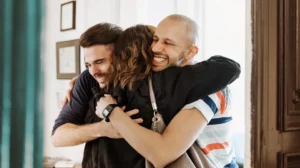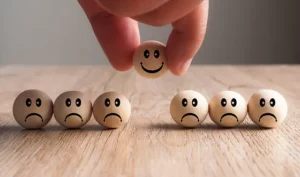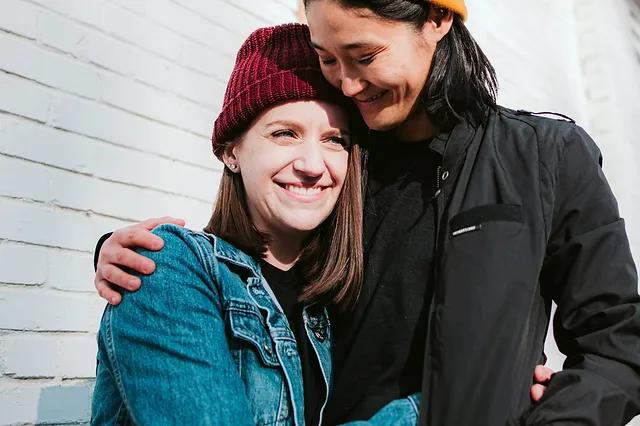Despite many similarities with heterosexual relationships, LGBTQ+ relationships often encompass unique experiences and hurdles, requiring a specialized approach to counseling. This blog aims to shed light on the intricate aspects of LGBTQ relationship counseling, providing valuable insights to help couples navigate their journey with grace, understanding, and love.
Contents
Why Is LGBTQ Counseling Important?
 LGBTQ+ counseling is essential for several reasons:
LGBTQ+ counseling is essential for several reasons:
- Unique Challenges
People who identify as LGBTQ+ often face unique challenges, both personal and societal. And that may not be experienced by those who identify as heterosexual or cisgender. These can include discrimination, stigma, the process of coming out, understanding and accepting one’s identity, transitioning, and relationship challenges unique to the LGBTQ+ community.
- Affirmative Environment
LGBTQ+ counseling provides a supportive, non-judgmental environment where individuals can express themselves freely. Counselors trained in LGBTQ+ issues understand the challenges faced by this community and provide an affirmative space where individuals can explore their feelings, identities, and experiences.
- Mental Health Support
Studies have shown that people in the LGBTQ+ community are at a higher risk for mental health issues, including depression, anxiety, and suicide. LGBTQ relationship counseling provides critical mental health support tailored to the specific needs of this community.
- Identity and Self-Acceptance
Coming to terms with one’s identity can be a complex process, particularly in a society that often stigmatizes non-heteronormative identities. These counselors can support clients in understanding and accepting their sexual orientation or gender identity, leading to improved self-esteem and overall mental health.
- Relationship Counseling
LGBTQ+ relationships, like all relationships, can benefit from therapy to navigate any issues that arise. However, these relationships may also face unique challenges, including societal discrimination, internalized homophobia, and the impact of coming out to loved ones. LGBTQ+ relationship counseling is specifically designed to address these unique issues and help couples build healthy relationships.
- Support During Transition
For transgender individuals, counseling can provide crucial support during transition, including dealing with societal reactions, understanding one’s identity, and navigating medical procedures.
By addressing these unique issues, LGBTQ+ counseling plays an essential role in supporting the mental health and well-being of individuals within this community.
How Is LGBTQ Relationship Counseling Delivered?
 LGBTQ relationship counseling is delivered much like any other form of relationship counseling, with a key focus on creating a safe, accepting, and understanding environment for all individuals involved. However, it also incorporates strategies to address unique issues that LGBTQ+ couples may face.
LGBTQ relationship counseling is delivered much like any other form of relationship counseling, with a key focus on creating a safe, accepting, and understanding environment for all individuals involved. However, it also incorporates strategies to address unique issues that LGBTQ+ couples may face.
Here’s a general overview:
Initial Assessment
Just like in any therapeutic scenario, the initial step in LGBTQ+ relationship counseling involves understanding the unique needs and concerns of the clients. The therapist will ask a series of questions to comprehend the relationship dynamics, problems, individual backgrounds, and goals for therapy.
Affirmative Approach
LGBTQ+ relationship counseling is often conducted from an affirmative approach, which means that it actively recognizes and addresses the diverse identities and unique challenges faced by LGBTQ+ individuals and couples. The counselor validates and affirms the couple’s experiences, fostering a non-judgmental and inclusive environment.
Focus on Communication
The counselor works with the couple to build open and effective communication strategies. This further helps them express their feelings, thoughts and needs to one another in a respectful and constructive manner. Also, the counseling sessions are designed to tackle the unique challenges faced by LGBTQ+ couples. That may include societal stigma, discrimination, internalized homophobia, issues related to coming out, and more.
Building Resilience and Coping Mechanisms
The counselor provides tools and strategies to help the couple build resilience and cope with any stress or discrimination they may encounter. This includes developing self-esteem, self-acceptance, and support systems outside of the relationship. And if one or both individuals in the couple are struggling with mental health issues, these can also be addressed within the context of the relationship counseling.
Regular Sessions
These counseling sessions typically occur regularly, such as once a week or biweekly, and can be held in person, over the phone, or through video conferencing. The duration of the therapy can vary depending on the couple’s unique needs and progress.
LGBTQ+ relationship counseling recognizes the rich diversity of experiences within the community. So, it strives to provide therapeutic support tailored to each couple’s unique journey.
What Techniques Are Used In This Counseling?
 LGBTQ relationship counseling integrates a variety of therapeutic techniques, customized to the unique needs and goals of the couple. Some common techniques and approaches used include:
LGBTQ relationship counseling integrates a variety of therapeutic techniques, customized to the unique needs and goals of the couple. Some common techniques and approaches used include:
Cognitive-Behavioral Therapy (CBT)
This approach helps couples identify and change negative thought patterns that can impact emotions and behaviors. For LGBTQ+ couples, it can be particularly beneficial for addressing issues. Such as internalized homophobia or biphobia, low self-esteem, or anxiety.
Emotionally Focused Therapy (EFT)
EFT is an approach often used in couples therapy that focuses on adult relationships and attachment/bonding. It can help couples better understand their emotional responses and needs, facilitating deeper emotional intimacy.
Narrative Therapy
This therapy helps couples explore their personal narratives and the stories they tell about their relationships. It can be particularly helpful for LGBTQ+ individuals to rewrite narratives shaped by societal discrimination and stigma.
Solution-Focused Brief Therapy (SFBT)
SFBT focuses on finding solutions in the present time and exploring future hopes rather than delving into past experiences. This can be helpful for LGBTQ+ couples who wish to work on building a more positive relationship dynamic.
Systemic Therapy
This approach considers the wider systems and structures in which individuals exist (like family, society, and culture) and how these impact the relationship. For LGBTQ+ couples, systemic therapy can help address external societal pressures or family dynamics that affect the relationship.
Affirmative Therapy
The affirmative approach acknowledges and respects the identities and experiences of LGBTQ+ individuals. It involves challenging internalized negative beliefs and fostering self-acceptance. And building resilience in the face of societal discrimination.
These techniques, used individually or in combination, aim to strengthen the relationship and boost mental health within the context of LGBTQ+ relationship counseling.
How To Find LGBTQ Relationship Counseling Near Me?
 Finding LGBTQ relationship counseling near you can be made easier by following these steps:
Finding LGBTQ relationship counseling near you can be made easier by following these steps:
- Search Online
A simple Google search using the phrase “LGBTQ+ relationship counseling near me” can provide a list of local therapists who specialize in this area.
- Therapist Directories
Online directories such as MantraCare, the American Association of Sexuality Educators, Counselors, and Therapists (AASECT), and the National Queer and Trans Therapists of Color Network (NQTTCN) have search features. These allow you to find therapists based on specialties, including LGBTQ+ counseling.
- LGBTQ+ Organizations
Reach out to local or national LGBTQ+ organizations for recommendations. They often have resources and contacts in the mental health field and may be able to recommend LGBTQ+-affirming therapists in your area.
- Teletherapy
If you cannot find a suitable therapist near you, consider teletherapy. Many therapists offer online counseling, allowing you to access services regardless of your location.
- Referrals
You can ask for referrals from trusted sources such as your primary care doctor, friends, family members, or others in the LGBTQ+ community.
- Insurance Provider
Contact your insurance provider for a list of in-network therapists who specialize in LGBTQ+ relationship counseling.
- Interview Potential Therapists
Once you have a list of potential therapists, contact them for a brief interview. You can ask about their experience with LGBTQ+ counseling, their approach to therapy, their qualifications, and any other questions you might have.
Remember, it’s crucial to find a therapist who you feel comfortable with, and who demonstrates respect, understanding, and affirming attitudes towards your identities and experiences. Therapy is a deeply personal process, and the right therapist can make a significant difference in your journey.
Conclusion
In conclusion, LGBTQ relationship counseling is significant in promoting mental well-being, enhancing communication, and creating a more inclusive, understanding world. This specialized counseling approach underscores the importance of love, respect, and acceptance, regardless of one’s sexual orientation or gender identity.
Love knows no bounds, and with the right guidance and support, every couple can navigate their shared life journey with grace, resilience, and mutual understanding. Always remember, seeking help is a testament to your strength and commitment to your relationship.
Life may sometimes be challenging for people from the LGBTQ community, but Online LGBTQ Counseling can help. Get experienced LGBTQ therapists at PrideMantra: Book a trial LGBTQ therapy session


